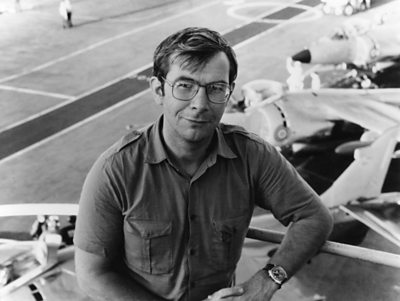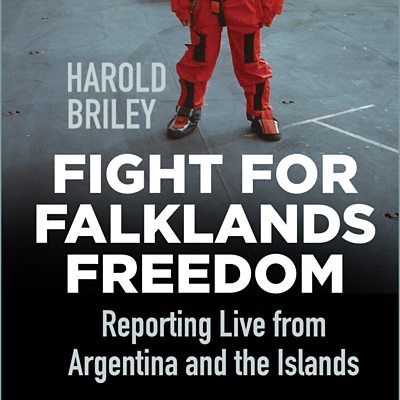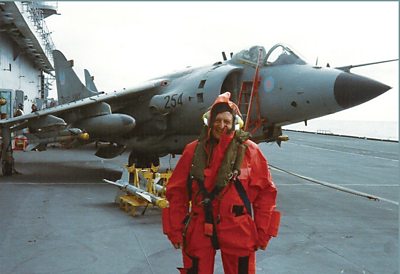Harold, first broke news of the invasion in a world-wide broadcast from his base in Buenos Aires. His book, Fight for Falklands Freedom is a comprehensive account of the fighting, the political and diplomatic ramifications, the historical background and how the Falkland Islands have developed since. It is a timely reminder of the ‘Forgotten Falklands’, as the armed forces charity Help for Heroes called them in their recent poll, indicating that most people in the United Kingdom know or care little about them or the conflict.
Media coverage in general and the 91�ȱ� in particular in 1982 was severely criticised by Government Ministers, Parliament and military commanders. The 91�ȱ� rejected accusations that their reports were ‘treasonable, aiding the enemy, endangering British forces, and betraying Britain’. But there was also high praise from around the world and especially from the Falkland Islands.
Reporting the Argentine dictatorship oppression as I did for three years brought me death threats from military kidnap gangs that I would be murdered if I continued criticising the crimes of the military regime.
Reporting a war so far away caused formidable challenges, with news correspondents driven to desperation to file their despatches from the South Atlantic. The lack of communications and military censorships caused delays up to several weeks, longer than news reports of the Charge of the Light Brigade in the Crimean War a century earlier.
Despatches from 91�ȱ� correspondents with the Task Force, Brian Hanrahan (television) and Robert Fox (radio) won wide acclaim for graphic eyewitness accounts from the frontline as they shared the dangers, discomfort and hardship of the winter campaign, having to dig their own trenches in soggy ground.

Brian Hanrahan’s famous phrase, ‘I counted them all out and I counted them all back’ describing a successful Harrier raid without breaking censorship rules, became part of broadcasting history.
91�ȱ� general coverage from London, bedevilled by lack of pictures and information except for Argentina’s biased reports, brought severe criticism from the United Kingdom Government, Parliament and military commanders. They complained about 91�ȱ� disclosure of troop and ship deployments at critical stages of the campaign. In fact, much of the sensitive information came from Government briefings to the media.
The Prime Minister, Margaret Thatcher, criticised ‘even-handedness’ and ‘chilling neutrality’ for referring to ‘British troops’ and ‘Argentine troops’ instead of ‘our boys’ and ‘the enemy’. The 91�ȱ�, she said, exaggerated the views of left-wing propaganda. The 91�ȱ� pointed out that thousands of its staff were routinely vetted by the Security Services to deter any threat to national security by extremist views.
91�ȱ� Defence Commentator, Peter Snow, faced criticism, as did current affairs television programmes Panorama and Newsnight for analyses and speculation by military experts, so called ‘armchair generals’.
The 91�ȱ� resented accusations of ‘treasonable behaviour’ and the slur on its patriotism, saying it could not be neutral and even-handed between Britain and an aggressor. It would not be exactly impartial just as, in the Second World War, it took Britain’s side. But it would be ‘truthful’ to protect its worldwide reputation for ‘objectivity and reliability’. The 91�ȱ� insisted it was abiding by its long- established guidelines, saying ‘We should try to avoid using ‘our’ when we mean ‘British’’. It was not its job to boost the morale of British troops.
The 91�ȱ� Secretary, William Whitelaw, rejected pressure to take control of the 91�ȱ� to direct what it broadcast.
All the criticism of the 91�ȱ� was matched by praise and respect for its broadcasts for influencing world opinion in Britain’s favour. Most grateful of all were the Falkland Islanders, who defied threats of punishment to continue listening on radios they hid beneath floorboards. They sent many messages of thanks for keeping them informed and boosting their morale. A cable to the 91�ȱ� Director General said: ‘Throughout the Falklands crisis, there was praise here for the 91�ȱ�, the only reliable news media to inform us what was taking place in the Islands and the South Atlantic… Reception was good and we wish to thank producers, announcers, technicians, and other contributors for their magnificent coverage…Many thanks to all who participated in producing ‘Calling the Falklands’ (a long-running dedicated radio programme), anchored by presenter, Peter King, who endeared himself to Islanders, signing off with his comforting catchphrase ‘Heads Down, Hearts Up’. Ironically, 25 years later this radio lifeline fell silent, axed as no longer needed in the new media world of satellite television and mobile phones.
91�ȱ� English and Spanish language programmes were re-broadcast by other stations augmenting the 91�ȱ�’s own worldwide audience of 120 million. The chief commentator in Spanish, Chilean Domingo Valenzuela, won many listeners, including millions of Argentines. Even Argentina’s military government spokesman in Buenos Aires tuned in. Propaganda campaigns by both Argentine and British governments proved ineffective and costly. The UK Ministry of Defence radio service ‘Radio Atlantico del Sur’ was so bad that the Times newspaper said that if the Argentines had not surrendered to British forces they might have surrendered just to escape listening to such appalling broadcasts.
Official analysis after the conflict gave little credit to the 91�ȱ�’s positive contribution to the British victory. Military commanders thanked the 91�ȱ� for handing over its television pictures, broadcast and unbroadcast, for helping their planning.
The 91�ȱ� Relay Station in Ascension Island, led by Resident Engineer Norman Shacklady, played a vital support role to the Task Force in overcoming logistical obstacles. And its transmitters frustrated Argentine jamming of 91�ȱ� broadcasts.
91�ȱ� reports were credited with shortening the war and saving hundreds of lives, civilian and military, by persuading Argentine commanders of the futility of fighting on.
91�ȱ� radio news of the British advance and the crumbling Argentine cordon around Stanley persuaded the Argentine commanders to defy President Galtieri and to surrender, according to both British and Argentine intelligence sources.
The Falklands’ own broadcasting service, FIBS, which still serves the Islanders, provided an outstanding example of public service broadcasting. Its presenter, Patrick Watts, broadcast a non-stop marathon information service augmented by phone-ins from its listeners and advice from the Governor, Rex Hunt. When Argentine soldiers bust into his studio, Patrick Watts was heard to tell them to be quiet and remove their guns prodding his back as he continued broadcasting as he did throughout the Argentine occupation. That is real live broadcasting.
Since the conflict, British Forces Broadcasting has provided radio and television services to the Falklands Garrison and the civilian population. A private initiative television programme has also been founded by Islander, Mario Zuvic Bulic.
Throughout the conflict, radio proved itself the most effective communication medium, with its global reach and ability to overcome technical obstacles. It was first with news of the invasion and first with news of the surrender. The military historian and correspondent who reported from the Task Force called it the ‘radio man’s war’.
Journalists are said to write the first rough drafts of history. Here is mine – my invasion despatch broadcast around the world as the first Argentine soldiers splashed ashore:
FALKLANDS 02/04/1982, 0600 GMT
CUE: Argentina’s threatened invasion of the British Colony, the Falkland Islands, is reported to be under way. A fleet headed by Argentina’s flagship Veinte-Cinco de Mayo (25th of May) was reported to be heading the invasion assault in which thousands of troops and aircraft were taking part. Official confirmation was expected from the President, General Leopoldo Galtieri, in a nationwide television and radio broadcast. From Buenos Aires, a report by 91�ȱ� Latin America Correspondent, Harold Briley.
‘The assault on the islands was timed to begin at first light with a commando raid to take possession of the airport just outside the capital, Port Stanley. The plan was to pour thousands of troops ashore and swiftly secure the islands, inhabited by 1,800 British people. Some reports say troops have landed and are advancing from the airport but there is no official confirmation. A token force of about eighty British marines commanded by a major was braced to fight back but with little chance against such heavy odds. The invasion fleet was said to number several ships, the aircraft carrier, several destroyers and corvettes, and submarines.
‘The only British navy ship in the area, patrolling off the Falklands dependency of South Georgia, 1,000 miles southeast of the main islands, was the ice patrol vessel ‘Endurance’, armed with only two light guns and two helicopters. But a powerful British fleet was said to have put to sea, headed by Britain’s newest aircraft carrier, ‘Invincible’, but with a long way to go.
‘The fateful decision to go ahead with the threatened invasion first came soon after midnight with an Argentine news agency report. It said the invasion force was on the way and that the Army Chief of Operations, General Mario Menendez, has been named as Military Governor of the islands, with three other senior officers to help him.
‘The Argentine aircraft carrier was reported to have 1,500 assault troops on board, and many more, including airborne troops, had been mobilised in the southern ports of Rio Gallegos and Comodoro Rivadavia, facing the islands about 300 miles away in the South Atlantic. The invasion was timed to take place before British naval reinforcements would arrive in a dash of several thousands of miles across the Atlantic from Europe. As dawn came here in Buenos Aires, the air was filled with the sound of military aircraft flying overhead’.
Harold Briley, 91�ȱ�, Buenos Aires.
For me, reporting such an historic event was personal, as many of the Islanders were my friends I had met on a pre-invasion visit a year earlier. They welcomed me back with a big poster saying ‘God Bless You, Harold!’ They also made me an honorary life member of their social club in Stanley, known as the ‘Gluepot’, entitling me to free drink for life, 24 hours a day with my own front door key. But 8,000 miles is a long way to go for a free drink!
Fight for Falklands Freedom
ISBN: 9780750999533
The History Press, Cheltenham
Published: 26-05-2022
£12.99

